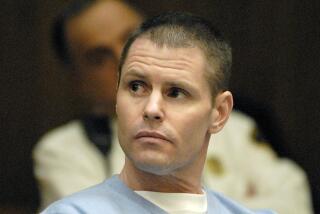2 Boston Brothers: One Did Good, One Didn’t
BOSTON — One brother went bad. The other chose respectability.
This week, the paths of legendary gangster James J. “Whitey” Bulger--a fugitive since 1995--and his brother William Bulger--former head of this state’s Senate and now president of the University of Massachusetts--are colliding in a highly public way.
As William Bulger’s university prepares to host the first presidential debate Tuesday, excavation crews were digging within shouting distance of the Boston campus for bodies linked to his brother, who was indicted Thursday on 21 counts of murder. Since January, five bodies have been dug up not far from where George W. Bush will face off with Al Gore.
Advising politicians and media types descending on the city for the debate, Boston Herald columnist Howie Carr wrote Friday: “When you glance south from UMass-Boston and you see the backhoes and the Bobcats digging there . . . don’t ask [William] Bulger what they’re digging for.”
Known widely by his nickname, Whitey Bulger was feared as a ruthless gang leader who demanded fierce loyalty. For 25 years he served as an FBI informant, sometimes winning praise for the invaluable information he was said to have provided.
But prosecutors say he was also a vicious killer.
“The victims include strangers who happened to be in the wrong place, longtime criminal associates, friends and others,” said U.S. Atty. Donald K. Stern.
One victim was a gang girlfriend. Another was the daughter of a mobster’s live-in companion who apparently asked too many questions. Investigators say the 12-year killing spree stretched as far as Tulsa, Okla., but most of the killings occurred in Boston.
Whitey Bulger Seen as Ultimate Godfather
Beyond the ironic timing, the indictments of Whitey Bulger and his longtime associate Stephen “The Rifleman” Flemmi offered a chilling reminder of a partnership the FBI might prefer to forget.
As head of the Winter Hill gang here, Whitey Bulger allegedly controlled most of the city’s drug traffic. The indictment alleges he had already killed seven people and wounded five others when the FBI approached him to serve as an informant against rivals in the New England Mafia.
In South Boston, Whitey Bulger operated as a kind of supreme godfather.
“You had a husband giving a wife a hard time, that’s the stuff you went to him for,” said Peggy Davis-Mullen, a South Boston native who represents her community on Boston’s City Council.
Michael Patrick MacDonald, author of “All Souls: A Family Story From Southie,” his memoir about South Boston, said that along with drugs, Whitey Bulger traded in bookmaking, extortion, racketeering and money laundering.
“He was in charge,” MacDonald said. “Nothing illegal happened without his stamp of approval.”
During his tenure as a government informant, Whitey Bulger allegedly killed at least 11 people. The Bulger case has produced a revision of FBI informant policies, said Charles S. Prouty, recently appointed as special agent in charge of the FBI’s Boston office. The case, Prouty said, “is repugnant to all FBI employees.”
U.S. Atty. Stern called the matter “a deep stain on the FBI.”
Former FBI agent John J. Connolly Jr., who served as the agency’s handler for Bulger and Flemmi, previously was indicted on racketeering charges. Connolly is accused of tipping off the gangsters about investigations. He also is accused of alerting Bulger in 1995 as he was about to be indicted on racketeering charges.
While testifying under a grant of immunity, former FBI supervisor John Morris admitted taking bribes from Bulger and Flemmi. Flemmi, 66, has been jailed since 1995, awaiting trial on racketeering and other charges.
3 Victims Buried in House Basement
Among other details, the murder indictment reveals that three Bulger victims were buried in the basement of a South Boston house. Authorities say that when the house was about to be sold the bodies were exhumed and moved to a makeshift grave in the Dorchester section of Boston. Acting on a tip, investigators unearthed those bodies in January.
Investigators continued to dig Friday along the Neponset River in Quincy, south of Boston. The site is believed to be the burial spot of Flemmi’s longtime girlfriend, Debra Davis, 26, who disappeared in 1981 after planning to leave him for another man.
The grim excavation on beaches and in marshes just south of the city has become an object of curiosity for joggers, dog walkers and even school groups. Not far from the Big Dig, Boston’s 10-year highway reconstruction project, the search for mob bodies has been dubbed “the Little Dig” by local TV and radio commentators.
Whitey Bulger, now 71, has emerged as a local pop icon. Since his disappearance, “Whitey” sightings have become the Boston equivalent of imagined glimpses of Elvis Presley.
But no one has come close to claiming the $250,000 federal reward offered for the gangster’s capture.
William Bulger, 66, avoids the press and never comments on questions pertaining to his brother.
Whitey Bulger is believed to be in hiding with his longtime girlfriend, Catherine Greig, now 51.
More to Read
Get the L.A. Times Politics newsletter
Deeply reported insights into legislation, politics and policy from Sacramento, Washington and beyond. In your inbox three times per week.
You may occasionally receive promotional content from the Los Angeles Times.










